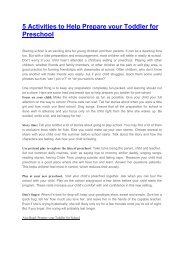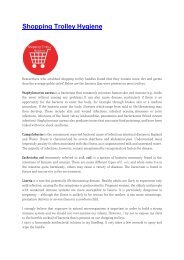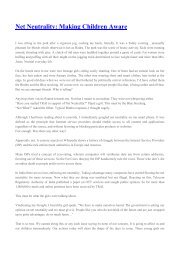A Parent’s Role in Career Choices
The Pathways Program is an education services enterprise that provides career guidance and skill development
The Pathways Program is an education services enterprise that provides career guidance and skill development
You also want an ePaper? Increase the reach of your titles
YUMPU automatically turns print PDFs into web optimized ePapers that Google loves.
R Sridhar, an <strong>in</strong>novation coach<br />
based <strong>in</strong> Mumbai (and an expert<br />
on the ParentEdge panel),<br />
recently conducted a workshop<br />
called ‘I WISH’ with students<br />
of Grade 9. The workshop<br />
facilitated a discussion on career<br />
choices by help<strong>in</strong>g students<br />
understand their top five talents,<br />
and then us<strong>in</strong>g these to explore<br />
career options. His reflections<br />
are captured below:<br />
“Parents should play the role<br />
of a facilitator. They need to<br />
acknowledge that today’s<br />
children could know much<br />
more than they do. ‘I am the<br />
parent and older, so I am<br />
right’ is no longer valid! As a<br />
facilitator, the parent should<br />
first listen, without judg<strong>in</strong>g if<br />
the child is right or wrong.<br />
Children see the parents’<br />
role as very important <strong>in</strong> the<br />
decision-mak<strong>in</strong>g process. So<br />
we should avoid forc<strong>in</strong>g them<br />
<strong>in</strong>to the dilemma of reconcil<strong>in</strong>g<br />
their wishes with their parents’.<br />
“Parents should understand<br />
that the child is at a crossroads.<br />
They don’t want to rebel, they<br />
want a resolution. If they are<br />
shown a reasonable way, which<br />
stems from understand<strong>in</strong>g, they<br />
are will<strong>in</strong>g to listen.”<br />
What advice would you give parents on<br />
be<strong>in</strong>g good facilitators <strong>in</strong> this process?<br />
• Realise it is an important decision, and<br />
be proactive and not reactive.<br />
• Invest time and approach the<br />
discussion <strong>in</strong> a structured manner. Do<br />
not let it happen like the ‘flavour of<br />
the day’; rather, get <strong>in</strong>to specifics.<br />
• Start the discussion early – <strong>in</strong> Grade 9,<br />
as <strong>in</strong> our country the child has to make<br />
a choice of subjects after Grade 10.<br />
• Keep the channels of communication<br />
open. Be accept<strong>in</strong>g so that the child<br />
can share hopes, fears and dreams with<br />
you. This will help children be open<br />
about their choices rather than simply<br />
make statements which they th<strong>in</strong>k<br />
their parents want to hear.<br />
• Seek professional help to facilitate<br />
the process better and do your best to<br />
make children understand the ‘world of<br />
work’.<br />
56<br />
May - June 2013


















